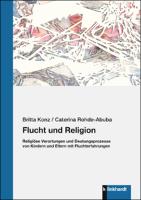Flucht und Religion
Religiöse Verortungen und Deutungsprozesse von Kindern und Eltern mit Fluchterfahrungen
| dc.contributor.author | Konz, Britta | |
| dc.contributor.author | Rohde-Abuba, Caterina | |
| dc.date.accessioned | 2021-12-20T12:03:23Z | |
| dc.date.available | 2021-12-20T12:03:23Z | |
| dc.date.issued | 2021 | |
| dc.identifier | OCN: 1303522939 | |
| dc.identifier.uri | https://library.oapen.org/handle/20.500.12657/52157 | |
| dc.description.abstract | Based on an interdisciplinary qualitative-empirical study with Muslim, Christian and Yezidi families, this book is dedicated to the significance of religion for coping with traumatic experiences in escape processes. With the help of the concept of VulnerAbility, this book shows how the children and their parents generate agency through their faith and membership to a religious community (Belonging). In individual adaptations, they adapt their religious heritage, which is revealed in images of God and religious relevance systems, to new life contexts in a meaningful way. This allows them to develop positive visions of the future through recourse to their faith, even if they have experienced religious membership as the subject of social conflict-lines that are established in the context of origin, on the flight routes and in the German asylum system through practices of discrimination. | en_US |
| dc.language | German | en_US |
| dc.subject.classification | thema EDItEUR::J Society and Social Sciences::JN Education | en_US |
| dc.subject.other | Flucht; Religion; Trauma <Psy>; Bewältigung; Flüchtling; Glaube; Deutung; Kind; Eltern; Frau; Religiöse Identität; Identitätsbildung; Religionserziehung; Migration; Bildungsprozess; Kindheitsforschung; Familie; Resilienz; Vulnerabilität; Agency-Theorie; Handlungsfähigkeit; Konfession; Perspektive; Islam; Christliche Religion; Migrationshintergrund; Interview; Deutschland; Flight; Running away; Coping; Refugee; Belief; Child; Parents; Woman; Women; Identity formation; Religious education; Educational process; Family; Capacity to act; Denomination; Perspective; Immigrant background; Migration background; Germany | en_US |
| dc.title | Flucht und Religion | en_US |
| dc.title.alternative | Religiöse Verortungen und Deutungsprozesse von Kindern und Eltern mit Fluchterfahrungen | en_US |
| dc.type | book | |
| oapen.abstract.otherlanguage | Auf Grundlage einer interdisziplinären qualitativ-empirischen Studie mit muslimischen, christlichen und ezidischen Familien widmet sich dieses Buch der Bedeutung von Religion für die Bewältigung (Coping) traumatisierender Erlebnisse in Fluchtprozessen. Mithilfe des Konzepts der VulnerAbility zeigt dieses Buch, wie die Kinder und ihre Eltern durch ihren Glauben und die Zugehörigkeit zu einer Religionsgemeinschaft (Belonging) Handlungsfähigkeit im Sinne einer Agency generieren. In individuellen Adaptionsleistungen passen sie ihr religiöses Erbe, das sich in Gottesbildern und religiösen Relevanzsystemen offenbart, sinnstiftend an neue Lebenskontexte an. Dies erlaubt ihnen durch einen Rückgriff auf ihren Glauben positive Zukunftsimaginationen zu entwickeln, auch wenn sie Religionszugehörigkeiten als Gegenstand gesellschaftlicher Konfliktlinien erlebt haben, die im Herkunftskontext, auf den Fluchtwegen und im deutschen Asylsystem durch Praktiken der Diskriminierung etabliert werden. | en_US |
| oapen.identifier.doi | 10.35468/5928 | en_US |
| oapen.relation.isPublishedBy | 9a084ee3-3f86-4be2-81d6-89c9fbc5f173 | en_US |
| oapen.relation.isbn | 9783781524910 | en_US |
| oapen.pages | 176 | en_US |
| oapen.place.publication | Bad Heilbrunn | en_US |

